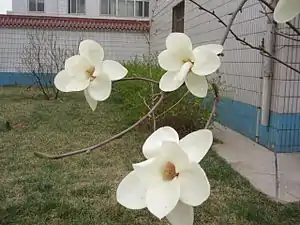Magnoliopsida
Magnoliopsida is a valid botanical name for a class of flowering plants. By definition the class will include the family Magnoliaceae, but its circumscription can otherwise vary, being more inclusive or less inclusive depending upon the classification system being discussed.

Cronquist and Takhtajan systems
In the Takhtajan system and the Cronquist system the name was used for the group known as dicotyledons.
Magnoliopsida in the Takhtajan system
The Takhtajan system used this internal taxonomy:
- class Magnoliopsida [= dicotyledons]
- subclass Magnoliidae
- subclass Nymphaeidae
- subclass Nelumbonidae
- subclass Ranunculidae
- subclass Caryophyllidae
- subclass Hamamelididae
- subclass Dilleniidae
- subclass Rosidae
- subclass Cornidae
- subclass Asteridae
- subclass Lamiidae
Magnoliopsida in the Cronquist system
The Cronquist system used this internal taxonomy (in the 1981 version):
- class Magnoliopsida [= dicotyledons]
- subclass Magnoliidae
- subclass Hamamelidae
- subclass Caryophyllidae
- subclass Dilleniidae
- subclass Rosidae
- subclass Asteridae
Dahlgren and Thorne systems
- class Magnoliopsida [= angiosperms]
- subclass Magnoliidae [= dicotyledons]
- subclass Liliidae [= monocotyledons]
Reveal system
The Reveal system used the name Magnoliopsida for a group of the primitive dicotyledons, corresponding to about half of the plants in the magnoliids:
- class 1. Magnoliopsida
- superorder 1. Magnolianae
- superorder 2. Lauranae
APG systems
In the APG and APG II systems botanical names are used only at the rank of order and below. Above the rank of order, these systems use their own names, such as angiosperms, eudicots, monocots, rosids, etc. These names refer to clades (unranked). This class Magnoliopsida is not defined. The idea that dicotyledons could be a taxonomic unit and get a formal name is rejected by the APG: the dicots are considered to be paraphyletic.
| Wikimedia Commons has media related to Magnoliopsida. |
| Wikispecies has information related to Magnoliopsida. |